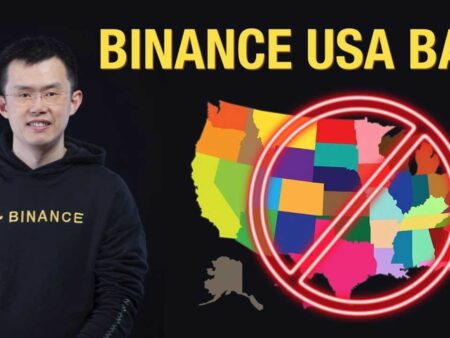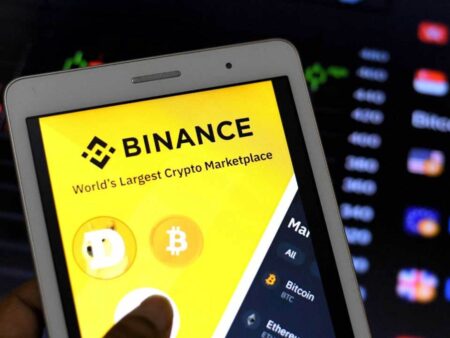Understanding Binance’s Operations in the United States
Binance is one of the world’s largest cryptocurrency exchanges, known for its wide range of trading options and innovative features. However, its operations in the United States have been complex and subject to scrutiny. Binance operates through a separate entity called Binance.US, launched in 2019 to comply with US regulations. This localized platform aims to cater to the American market by offering a selection of cryptocurrencies and services that meet the legal requirements imposed by US authorities.
The primary objective of Binance.US is to ensure compliance with the regulations set forth by the Financial Crimes Enforcement Network (FinCEN) and other relevant bodies. The exchange is designed to provide a safe and regulated environment for American traders, although it does not offer the full range of services available on the global Binance platform. This strategic shift was essential to address the regulatory concerns that had arisen around the original Binance platform, which did not operate under a specific US regulatory framework.
Despite its efforts to comply with US laws, Binance.US has faced challenges due to the rapidly evolving nature of the cryptocurrency landscape. With various states implementing their own regulations, Binance.US must navigate a complex web of legal requirements. This can impact what services are offered in different jurisdictions, making it vital for users to stay informed about their local laws and regulations concerning cryptocurrency trading.
Moreover, the distinction between Binance and Binance.US is crucial for users. While Binance may offer more advanced trading features and a broader selection of cryptocurrencies, Binance.US is tailored for American users and is limited to those offerings that comply with US regulations. This division in operations raises questions among users regarding which platform is suitable for their needs.
In this context, understanding the operational framework of Binance in the US is essential for potential users and investors. They must be aware of the limitations and obligations imposed on Binance.US to ensure they are engaging with a legally compliant platform.
As a result, potential users must weigh the benefits of using Binance.US against any inherent risks. The unique regulatory landscape in the US creates a situation where potential users must stay vigilant and informed.
The Legal Framework Surrounding Cryptocurrency Exchanges
The legal framework surrounding cryptocurrency exchanges in the United States is multifaceted, involving various federal and state regulations. At the federal level, cryptocurrency exchanges are primarily governed by the Securities and Exchange Commission (SEC), the Commodity Futures Trading Commission (CFTC), and FinCEN. These bodies oversee compliance with anti-money laundering (AML) laws, securities regulations, and other financial laws.
Additionally, each state has its own regulatory framework, which can complicate matters for cryptocurrency exchanges like Binance.US. Some states have adopted more stringent regulations, requiring exchanges to obtain specific licenses or adhere to unique operational guidelines. For instance, New York has implemented the BitLicense, a comprehensive regulatory framework for cryptocurrency businesses, which can pose additional challenges for exchanges seeking to operate in that state.
The legal definitions of cryptocurrencies themselves also play a critical role in the regulatory landscape. The SEC distinguishes between securities and non-securities, which determines whether a cryptocurrency is subject to securities regulations. This distinction can significantly affect the types of cryptocurrencies that exchanges can offer, often leading to the delisting of certain tokens from platforms to comply with regulatory demands.
Moreover, the lack of a unified federal approach creates a patchwork system where businesses must adapt to varying regulations across states. This regulatory uncertainty has led to increased scrutiny of cryptocurrency exchanges, with some even facing lawsuits and sanctions for non-compliance.
As a result, cryptocurrency exchanges must invest significant resources in legal compliance to operate within the bounds of US law. This can impact fees, user accessibility, and the overall experience for traders, making an understanding of the legal framework essential for any potential users of exchanges like Binance.US.

In summary, the legal landscape surrounding cryptocurrency exchanges is complex and requires businesses and users alike to stay informed about the evolving regulations to navigate the marketplace successfully.
Regulatory Challenges Faced by Binance in the US
Binance has encountered numerous regulatory challenges in the United States since its inception. One of the primary issues is the lack of clarity regarding the classification of cryptocurrencies. As regulatory bodies like the SEC and CFTC continue to refine their definitions and classifications, exchanges face the risk of inadvertently violating existing laws. This uncertainty has led to significant changes in the offerings available on Binance.US compared to the global Binance platform.
Another significant challenge is the state-by-state regulatory environment. Each state has its own regulations governing cryptocurrency exchanges, adding layers of complexity to compliance. For instance, Binance.US has had to adapt its offerings and operational structure to accommodate the various requirements imposed by different states, resulting in a fragmented user experience. This dynamic environment can lead to confusion among users about what services are available in their specific state.
The ongoing scrutiny from regulators has also led to legal challenges and investigations. For example, in 2021, Binance faced investigations from multiple regulatory bodies, including the SEC and the CFTC, for potential violations related to securities trading and market manipulation. These investigations raised concerns among users about the long-term viability of Binance.US and the safety of their investments.
Moreover, regulatory challenges have prompted Binance to take proactive measures to mitigate risks. The exchange has implemented enhanced KYC (Know Your Customer) procedures to comply with AML regulations, which can sometimes be cumbersome for users. These measures, while necessary for regulatory compliance, can also create friction in the user experience.
| Aspect | Binance | Binance.US |
|---|---|---|
| Headquarters | Originally in Malta | Based in the USA |
| Regulatory Compliance | Faces scrutiny; complex issues | Adheres to U.S. regulations |
| Available Offerings | Global services & features | Limited services for U.S. users |
The competitive landscape for cryptocurrency exchanges has also intensified. As more exchanges enter the market, Binance must navigate not only regulatory challenges but also increasing competition from platforms that may be more compliant or user-friendly. This has further complicated Binance’s efforts to establish itself as a reliable option for US traders.
In conclusion, the regulatory challenges faced by Binance in the US are multifaceted, affecting its operations, offerings, and user experience. The ongoing evolution of cryptocurrency regulations necessitates a vigilant approach from both the exchange and its users.
Recent Developments in Binance’s Legal Status
Recent developments in Binance’s legal status in the United States have raised significant concerns and questions for both users and regulators. In 2022, Binance faced heightened scrutiny from various regulatory agencies, including the SEC, which is investigating potential securities violations. These investigations have focused on whether Binance’s services and certain cryptocurrencies offered might fall under securities regulations.
In addition to federal scrutiny, Binance has also dealt with challenges at the state level. Several states have issued warnings or taken action against Binance and Binance.US for alleged non-compliance with state-specific regulations. For instance, states like New York and Texas have implemented restrictions that directly affect Binance’s ability to operate within their jurisdictions.
Furthermore, Binance’s proactive measures to enhance compliance have not gone unnoticed. The company has sought to bolster its legal team and engage with regulators to clarify its standing and address concerns. This approach has included voluntary disclosures and partnerships with compliance firms to ensure adherence to evolving regulations.
Another significant development has been Binance’s commitment to transparency. The exchange has begun to publish reports and updates regarding its compliance efforts, which could help alleviate user concerns. By proactively demonstrating its commitment to legal compliance, Binance aims to regain trust among its user base and stakeholders.
However, the ongoing investigations and regulatory hurdles pose serious challenges for Binance’s future in the US. Legal experts caution that if the investigations lead to significant penalties or restrictions, it could impact the exchange’s operations and user experience.
As a result, users must remain vigilant and monitor developments related to Binance’s legal status. Ongoing changes in regulations and regulatory actions could influence the range of services available on Binance.US, as well as the overall landscape for cryptocurrency exchanges in the United States.
User Experiences: Navigating Binance Legality in the US
User experiences on Binance.US vary significantly, primarily influenced by the ongoing regulatory landscape and the exchange’s compliance measures. Many users appreciate the localized services offered by Binance.US, which cater specifically to American traders. However, some have expressed frustration with the limitations imposed on the platform due to regulatory requirements.
For instance, users have noted that the selection of cryptocurrencies available on Binance.US is limited compared to the global Binance platform. This reduction in offerings can lead to disappointment for traders seeking access to specific altcoins or trading features. Additionally, users based in states with stricter regulations often face even further limitations, which can leave them feeling excluded from certain trading opportunities.
The user verification process has also been a point of contention. In an effort to comply with KYC and AML regulations, Binance.US has implemented rigorous verification procedures that some users find cumbersome. While these measures are essential for regulatory compliance, they can create a frustrating onboarding experience for new users eager to start trading.
Conversely, many users have praised Binance.US for its user-friendly interface and educational resources. The platform offers a variety of tutorials and guides that help users navigate the complexities of cryptocurrency trading, making it an appealing option for beginners. Additionally, Binance.US has made strides in customer support, providing timely assistance to users facing issues or questions.
However, user experiences can be inconsistent. Some traders have reported delays in customer service responses or issues with account verification that left them unable to access their funds. These frustrations can undermine trust in the platform, particularly in an industry where regulatory concerns are already causing anxiety among traders.
In conclusion, user experiences on Binance.US highlight the dual nature of navigating legality in the US cryptocurrency market. While the platform offers valuable resources and a tailored experience for American users, ongoing regulatory challenges can create limitations that impact the overall trading experience.
Future Implications for Binance and US Cryptocurrency Users
The future implications for Binance and US cryptocurrency users are highly contingent on ongoing regulatory developments and the platform’s ability to adapt. As regulatory scrutiny continues, Binance.US may face additional challenges that could influence its operations and offerings. The potential for further restrictions or penalties could result in limited trading options or increased fees for users.
For US cryptocurrency users, the evolving legal landscape presents both opportunities and risks. On one hand, the growing regulation of exchanges like Binance.US could lead to a more secure trading environment, ultimately fostering broader adoption of cryptocurrencies. Enhanced compliance measures may build user confidence and encourage new investors to enter the market.
On the other hand, the potential for increased regulation could stifle innovation and limit choices for investors. For











Regulatory challenges can impact user experience on platforms like Binance.US.
Enhanced KYC processes might be a hassle, but they’re necessary for compliance with regulations.
I learned that Binance.US is different from the global Binance platform due to US regulations.
I didn’t realize how much legal stuff affects what cryptocurrencies are available on exchanges like Binance.US.
The article explains how Binance has to navigate different state laws, which sounds complicated!
It’s interesting that New York has its own framework called BitLicense for crypto businesses.
State-by-state regulations make it hard for exchanges like Binance.US to offer all their services.
Understanding the difference between Binance and Binance.US is crucial for American traders.
Binance.US was launched in 2019 to comply with US laws. That’s important for American users.
The article says users need to be aware of local crypto laws. Good reminder!